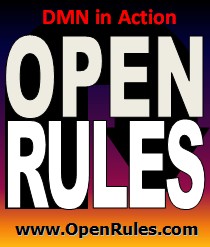Open Your Business Rules!
Rules-based
Operational Decision Services
Release Notes 6.1.1 (Aug-2011)
Release 6.1.1 advances the Executable Decisions introduced in the OpenRules® 6 by providing new features recommended by customers, the detailed user manual and new tutorials, and fixing newly found bugs. Below is the list of major changes:
-
Advanced decisioning templates that add the following features:
-
Specifying a hierarchy of decisions and related rule families with an ability to use conditions inside decision definition tables
-
Conditions and conclusion defined on any expressions (not only on variables defined in the Glossary)
-
Special types of decision tables that go beyond single-hit decision tables:
-
DecisionTable1 allow a user to define multi-hit tables with possible rule overrides
-
DecisionTable2 allows a user to sequentially execute rules inside a decision tables when the results of already executed actions (conclusions) may affect conditions of the consecutive rules
-
-
The Glossary table now has an additional (optional) column "Domain" that allows a user to limit possible values of fact types to certain domains. There is a special new decision execution mode that validates that all rule families satisfy the domain requirements
-
-
We added a very detailed User Manual (~150 pages) and several new tutorials:
-
We improved implementations of predefined types that deal with real numbers inside rules. In particular, the classes CompareToDouble, FromToDouble, and DomainDouble now have a public static double variable "precision" that is used when doubles are being compared for equality and inequality. By default, precision = 0.00000001.
-
Release 6.1.1 correctly supports all Date comparison operators (there was a bug in the release 6.0.1). There is a new sample project "DecisionHelloWithDates" that demonstrates how to deal with dates within decision tables.
-
We added a new type of decision tables called "RuleSequence" that is a multi-hit table that allows a user to avoid a preliminary evaluation of all rules before executing any actions. Thus, the execution of previous rules may affect conditions of the consecutive rules.
-
We improved OpenRules-based web applications: the default "index.jsp" file now guarantees that only one instance of the underlying OpenRulesEngine is used by all JSP sessions that use the same server applications. It essentially minimizes memory requirements for servers that support many concurrent clients.
OpenRules® team wants to thank all customers for the very active response to the OpenRules release 6.0 and recommended improvements.

